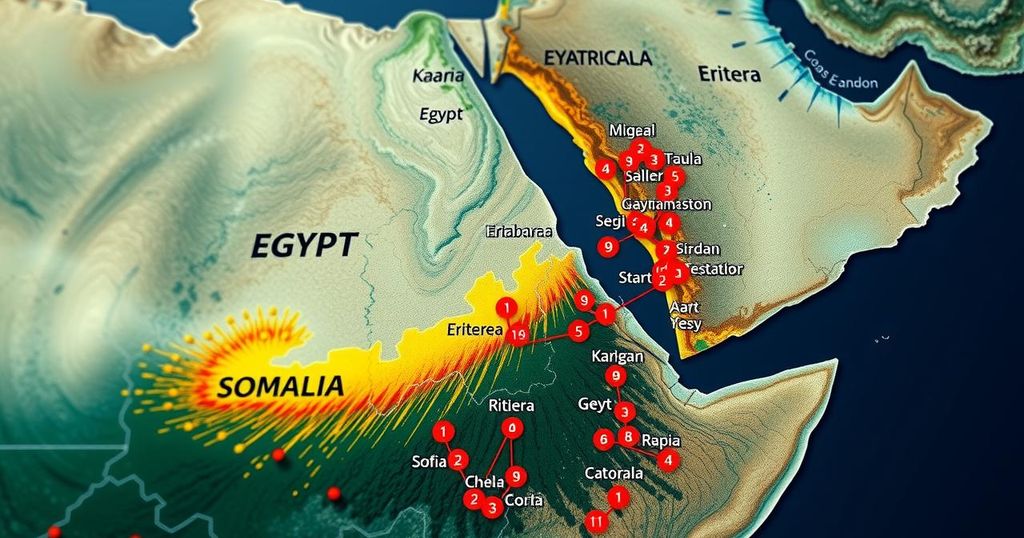Shifting Alliances in the Horn of Africa: An Egypt-Eritrea-Somalia Axis

The summit between Egypt, Eritrea, and Somalia indicates a significant geopolitical shift in the Horn of Africa aimed at counteracting Ethiopia’s influence. Despite being framed as a cooperative initiative, underlying tensions—particularly related to Ethiopia’s projects like the GERD and its relationships with Somaliland—suggest a strategic alignment among the three countries seeking to enhance their regional autonomy and security.
The recent summit held among Egypt, Eritrea, and Somalia in Asmara, signifies a notable geopolitical realignment in the Horn of Africa, a region historically characterized by instability, rivalries, and complex dynamics. While the summit was framed as an initiative to foster cooperation in response to security challenges, the underlying motive appeared to focus on strengthening a collective position against Ethiopia, which has become a pivotal figure in regional affairs. The discussions centered around enhancing autonomy and ensuring territorial integrity among the three nations, as articulated in their joint statement. The geopolitical landscape of the Horn of Africa has been heavily influenced by longstanding tensions involving Ethiopia, particularly concerning its relations with Somaliland and the ongoing dispute with Egypt regarding the Grand Ethiopian Renaissance Dam (GERD). Ethiopia’s controversial naval base agreement with Somaliland, coupled with a failure to recognize Somaliland’s independent status by Somalia, has exacerbated existing frictions. In August, Somalia solidified its military cooperation with Egypt through a formal pact, supplemented by Egypt’s provision of arms and military assistance to counter the al-Shabaab insurgency. These developments signal a shift away from Ethiopia’s influence in the region, suggesting that its relationships with neighboring countries may be deteriorating. Though Ethiopia was not expressly mentioned in summit discussions, it was evident that concerns regarding its actions were at the forefront. Egypt’s sustained tension with Ethiopia over the GERD, seen as a potential threat to its water supply, complicates relations further. Cairo’s hesitations regarding the impact of Ethiopia’s dam activities are exacerbated by the fragile negotiations that have stalled. The military presence of the Egyptian forces in Somalia serves as a strategic maneuver aimed at counterbalancing Ethiopia’s sway in the region. As Eritrea seeks to assert itself as a major player following its independence from Ethiopia in 1993, its partnership with Egypt reflects a concerted effort to limit Ethiopian power, especially given Eritrea’s advantageous geographical position near the Bab el-Mandeb Strait. The Asmara meeting suggests a significant redistribution of power within the Horn of Africa, indicative of a decline in traditional alliances. Egypt, Eritrea, and Somalia are not only enhancing military cooperation but are also consolidating their influence as a counterweight to Ethiopia’s ambitions. However, the implications of this evolving alliance remain uncertain, raising the question of whether it will lead to enhanced stability or further exacerbate tensions within the region. Despite Egypt’s geographical distance from Somalia, its engagement in the Horn raises concerns regarding potential proxy conflicts and deeper geopolitical maneuvers primarily driven by the GERD discontent. The dangers of increased hostility and border skirmishes, alongside the risk of extremist violence directed at Ethiopia from Somali territories, present a precarious scenario. In light of these developments, Ethiopia must participate actively in diplomatic efforts to mitigate challenges posed by its neighbors. Building robust relationships with international entities and strengthening ties with nations like Kenya and Sudan could provide the requisite counterbalance necessary to maintain stability. The establishment of a cooperative framework for managing Nile waters may prove crucial, while Ethiopia should prioritize transparent public diplomacy to clarify its intentions amid these shifting alliances.
The Horn of Africa is a region defined by historical grievances and complex political dynamics, where alliances frequently change, often influenced by external and internal conflicts. Ethiopia, as the second-most populous nation in Africa, has played a central role in these developments, mainly due to its strategic projects like the Grand Ethiopian Renaissance Dam and its contentious interactions with Somaliland. The shift in alliances, particularly among Egypt, Eritrea, and Somalia, signifies a potential reconfiguration of power aimed at countering Ethiopian influence, notable amid ongoing security concerns involving groups such as al-Shabaab and the implications of border disputes.
In conclusion, the recent summit among Egypt, Eritrea, and Somalia highlights a significant shift in the geopolitical landscape of the Horn of Africa. While ostensibly focused on regional cooperation, the deeper agenda reveals an intent to consolidate power against Ethiopia. The evolving alliances raise critical questions about stability and the potential for conflict, necessitating a proactive approach from Ethiopia in diplomatic relations and regional collaboration to secure its interests and address the complex dynamics at play.
Original Source: thehill.com








